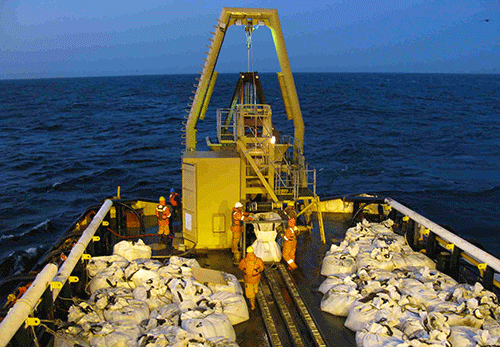WALVIS BAY – The Confederation of Namibian Fishing Associations says their objections against phosphate mining are misrepresented in the final verification document of Marine Spatial Planning and now gives the impression that they support the activity.
MSP is a guiding tool and will ensure the right activity takes place in the right area and facilitate the development of a sustainable ocean economy to benefit humans and the environment.
Currently, fishing activities and seabed mining (diamonds) have been co-existing successfully for decades.
However, with sectors such as phosphate mining and fuel explorations trying to penetrate the marine space, the MSP will be a critical sector for these activities to co-exist and operate.
However, the chairperson of the association, Matti Amukwa, said they participated in the MSP workshops to support a transparent process of managing marine-based activities.
“Despite our repeated expression of warnings and objections to experimental phosphate mining, our objections were not noted by the MSP in its final document,” Amukwa said.
He added MSP, in the released draft document, states that phosphate mining had been “favourably adopted” in the marine spatial plan and seeks a preferential mine testing option of phosphate on the Namibian seabed for a trial period of five years.
“Hence, we want to put it on record once again that this will most likely be detrimental for fishing in Namibia, and in radical conflict with input, the association provided at sessions we participated in.
“We are on record about the many scientifically-based concerns of the proposed Sandpiper project’s test mining operations, not least of which is the projected dispersal of heavy metals into the hake and monk spawning grounds. The association wishes to place on record that it cannot accept nor support the MSP in its current form,” he said.
Meanwhile, the Economic and Social Justice Trust on Monday also said various marine biologists have pointed out that marine phosphate mining would have
devastating long-term effects on the environment and could destroy Namibia’s fishing industry.
“It is with this background that we noted with greater concern that Namibian Marine Phosphate (NMP) plans to mine the seabed off the coast of Walvis Bay. The area where it wants to conduct its operations is on the edge of the breeding ground for hake, monkfish and horse mackerel. Hence, we are calling upon our government to put an end to proposed marine phosphate mining projects,” the organisation said.
Last year, Namibia’s High Court declined to invalidate a mining license awarded to NMP in 2011 after Namibian fishing industry organisations petitioned the court to declare the company’s mining permit invalid.
NMP, in a statement released in February, said they are taking the relevant steps to ensure its project complies with the high court ruling of last year.
NMP also conducted public meetings by notice for the application for an environmental clearance certificate (ECC) for ML170.
Public meetings were held in Windhoek and Walvis Bay in February.
“NMP is taking the relevant steps to progress the Sandpiper marine phosphate project in compliance with the ruling of the High Court on 30 June 2021, which confirmed the ongoing validity of NMP’s mining license (ML170),” reads the statement.
NMP said the proposed project is expected to, directly and indirectly, employ over 600 Namibians for construction and operations in Walvis Bay.
NMP is adamant the project will produce numerous economic benefits and jobs for Namibia from a phosphate-based industry.
Representatives of the Benguela Current Marine Spatial Management and governance project, which spearheads the MSP, yesterday indicated they are not in a position to comment on the issue and referred the newspaper to the fisheries executive director Annely Haiphene.
Haiphene also indicated she would only respond today on the issue. – edeklerk@nepc.com.na



